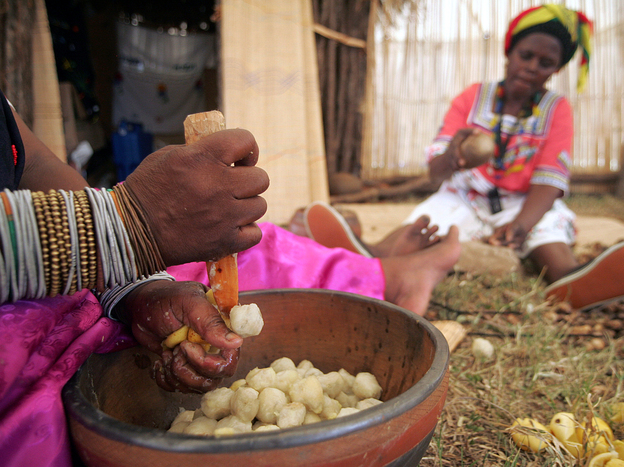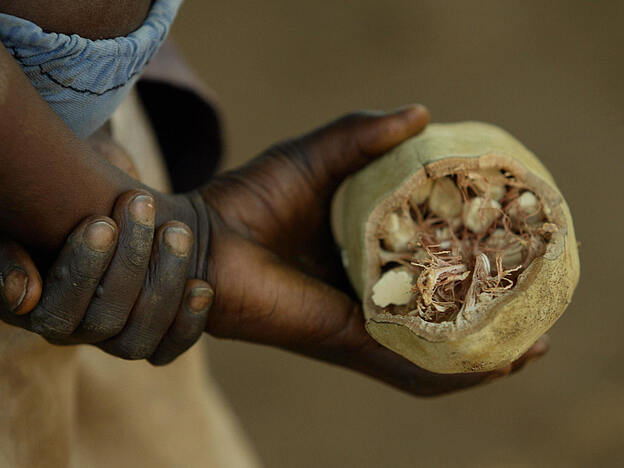 Enlarge image i
Enlarge image i Marula is one of the crops whose genome will be sequenced through the African Orphan Crops Consortium.

Marula is one of the crops whose genome will be sequenced through the African Orphan Crops Consortium.
"I'm shocked by the optimism here," Howard Yana-Shapiro, the chief agricultural officer for Mars Inc. said Tuesday to the audience of the Chicago Council on Global Affairs' Global Food Security Symposium in Washington, D.C.
Seated there before him were some of the leaders from the wealthiest international organizations and multinational companies of the fight to end hunger. And Shapiro told them they weren't even close.
"To pat ourselves on the back and say we've reached 4 million African children well, we need to reach 100 times that," he said.
About four years ago, Shapiro, a plant scientist who's also a senior fellow at the University of California, Davis, and the World Agroforestry Centre, learned about stunting, a result of malnutrition and undernutrition that affects 1 in 4 children worldwide.
Shapiro decided to make it his mission to use plant science to end stunting because, he says, the international community currently relies too much on food donations, or crops like corn with few nutrients. "We need nutrition security, not food security," he says. "A lot of the calories out there right now simply aren't that useful."
In 2011, Shapiro, and Mars yes, the candy company launched the African Orphan Crop Consortium, a project to improve the nutrition, productivity and climatic adaptability of little-known African food crops by mapping and analyzing their genomes. The 100 crops that are the focus of the AOCC include African eggplant, cocoyam and Ethiopian mustard. Shapiro says they have been neglected by researchers because they are not economically important on the global market.
 Enlarge image i
Enlarge image i The baobob fruit is one of the 100 traditional African food crops that a group of scientists want to learn more about to improve nutrition.

The baobob fruit is one of the 100 traditional African food crops that a group of scientists want to learn more about to improve nutrition.
Now, the Beijing Genomic Institute is helping the consortium to sequence these crops' genomes. The hope is that as the genome sequences start to become public next year, African scientists can breed more nutritious and productive varieties of the crops.
On Tuesday in Washington, Shapiro appealed to the world's biggest life sciences companies to help him by sharing what they already know about the 100 crops.
"I would appeal to the presidents of Dupont Pioneer and BASF and Monsanto to give us all the information they have on nutritional content and where the markers are on the plants for it," Shapiro said. "We're looking at the genomics to have a road map of what to do. We're looking for the turn signs, and I think those companies may have some of those signs."
But can the kings of agricultural intellectual-property technology get onboard with open source agricultural information for Africa? Monsanto, for one, regularly fights to protect its patents most recently in the Supreme Court.
Well, at least one company says it's planning to sit down and talk with Shapiro about his request.
Jane Slusark, a spokeswoman for Dupont Pioneer, says the company wants "to figure out where we may have that knowledge and opportunities to collaborate."
Not long ago, DuPont donated its patented technology to improve the nutrition, production and availability of sorghum, a staple crop in Africa, to the Africa Biofortified Sorghum initiative.
Ag Biotech News Scoop.it Scoops on agricultural biotech, GMOs and related info
>> CLICK on the titles to get to the full, original versions! Agriculture - Wikipedia, the free encyclopedia Agriculture, also called farming or husbandry, is the cultivation of animals, plants, fungi, and other life forms for food, fiber, biofuel. drugs and other products ... Constraints on Crop and Animal Productivity in Sub-Saharan Africa ... Citation Manager Export the bibliographic data for this book in your chosen format; Web Search Builder Use this book's key terms to search within this book, across ... Formatted-018-sakiko-GM Crops Food Sec Africa WP 2012-018: January 2012 GM Crops for Food Security in Africa The Path Not Yet Taken Sakiko Fukuda-Parr and Amy Orr 1 1 Sakiko Fukuda-Parr, The New School ... Are transgenic crops safe? GM agriculture in Africa - United ... Despite numerous studies demonstrating the benefits of genetic modification (GM) technology particularly its potential to increase food security in developing ... Genetically Modified Crops Mission 2014: Feeding the World Overview. For thousands of years, human beings have modified nature's organisms for usage in agriculture. New technology has furthered this trend: recombinant DNA ... Biotechnology - Wikipedia, the free encyclopedia Biotechnology is the use of living systems and organisms to develop or make useful products, or "any technological application that uses biological systems, living ... Seeds: Biotech/seed industry interests - History Commons A number of agricultural biotech firms secure patents on genetic use restriction technologies (GURTs). GURT, more commonly known as terminator technology ... Africa Rice Center (AfricaRice) AfricaRice is a leading pan-African rice research organization committed to improving livelihoods in Africa through strong science and effective partnerships. Regulators Discover a Hidden Viral Gene in Commercial GMO Crops by Jonathan Latham and Allison Wilson How should a regulatory agency announce they have discovered something potentially very important about the safety of products ...
No comments:
Post a Comment